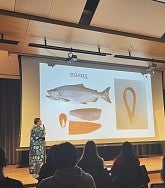April 2, 2025 - 9:00am
Ichishkíin, also known as Sahaptin, is a severely endangered Native American language of the Pacific Northwest. Several Tribes from the region are working diligently to revitalize the language and a committed group of educators, linguists and Tribal members at the University of Oregon are working to support those efforts. The latest achievement is the extension of the two-year language learning program to include a third year of instruction in Ichishkíin at the University of Oregon.
"This is a huge accomplishment! It has been in the works and in dreams for awhile,” said Joana Jansen, associate director of the Northwest Indigenous Language Institute. “Students have asked and pushed for this class.”
Ichishkíin is spoken primarily by members of the Yakama Nation in Washington State and members of the Confederated Tribes of the Warm Springs Reservation as well as the Confederated Tribes of the Umatilla Indian Reservation in Oregon.
Introduced in 2008 into the UO curriculum thanks to the efforts of linguist and Yakama elder Tuxámshish, Virginia Beavert, it fulfills the bachelor’s language requirement after two years of study. Regan Anderson learned from Tuxámshish, and instructs the class. Like many North American Indigenous languages, Ichishkíin functions very differently than Indo-European languages such as English, Spanish or German. It is classified as a category IV language, the most challenging to learn for native English speakers — comparable to Arabic, Cantonese, Mandarin, Japanese and Korean.
The course is popular with students for whom Ichishkíin is their heritage language, but it’s also appealing to Native and non-Native students who want to understand more about Northwest Native history and cultures, or to those who want an opportunity to study and understand a language that functions radically different than English.

“I have seen the Ichishkíin language program and classes grow so much over the years since I have been a student at the University of Oregon. There is a need and want to learn Ichishkíin, especially for Native students whose tribal language is in fact Ichishkíin,” said Kaitlynn Spino, a marine biology and Native American and Indigenous studies double major graduating spring 2025. “These classes are more than just a place to learn a language; they are a place for connecting, honoring and celebrating Ichishkíin, and the people whose language it is!”
A class teaching a third year of Ichishkíin was offered for the first time in fall 2024. The curriculum focuses on more practical applications of the language including formal speeches, transcribing and translating recordings from Yakama Nation elders, and creating materials that families and tribal members can use. Spino said it offers students the opportunity to make an impact on people beyond the classroom.
“This is my tribal language, and I am one of the first people in my immediate family that has been able to speak the language,” said Spino. “I suppose it goes beyond just teaching it or incorporating it into my career or work in the future. I have an obligation and responsibility to the language in my daily life to keep it alive and present!”
Robert Elliott, director of NILI, said offering this third year of the language is something unique and special UO can do.
“Ichishkíin is a totally unique part of the cultural heritage of our state and region. The Tribes have entrusted UO to help take care of the language and to respect it,” he said. “Adding a third year of Ichishkíin also helps Native students claim their identity, ownership and stewardship of the language.”
The effort to expand the course curriculum was led by a collaborative team of experts including Beavert, Regan Anderson at NILI, Michelle Jacob from UO’s College of Education. Additional advocates for third year were Spike Gildea and Volya Kapatsinski, both professors of linguistics. The effort was supported by leaders in the College of Arts and Sciences including Tykeson Dean of Arts and Sciences Chris Poulsen and Divisional Associate Dean of Humanities Harry Wonham.
Students interested in taking Ichishkíin can find more information through the Department of Linguistics, the Department of Native American and Indigenous Studies or NILI.
—By Jenny Brooks, College of Arts and Sciences
